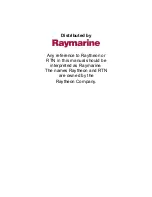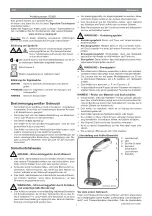
12
CHARACTERISTICS / INSTALLATION
EN
QUICK SPA
QCC CLG30 RGBW - REV001B
READ CAREFULLY BEFORE CONNECTING THE DEVICE
The CHALLENGER is a underwater lighting device. Any other use is incorrect. Quick S.p.A. cannot be prosecuted for any
damage due to an incorrect installation or an incorrect connection or an incorrect use of the device. The correct installa-
tion, connection and use is described in the present paper.
WARNING
• Never use solvents: cleaners, paint and other products may contain strong solvents, such as acetone, which attack
many plastics greatly reducing their strength.
• Never pull, carry or hold the sensor by the cable, it may sever internal connections.
Quick S.p.A will not be responsible in case of wrong connection and misuse of this device.
READ THESE INSTRUCTIONS CAREFULLY BEFORE USING THE CHALLENGER. IN CASE OF DOUBT, CONTACT
YOUR DEALER OR QUICK
®
CUSTOMER SERVICE.
TOOLS AND MATERIALS
• Safety goggles • Dust mask
• Electric drill: drill bin 3 mm (1/8’’) - Hole saw 22 mm (7/8’’) - Hole saw 52 mm (2” 3/64’) (Cored fibreglass hull)
- drill bin 12 mm (15/32’’) (without thru-hull) - Hole saw 43 mm (1” 11/16) (without thru-hull)
• Sandpaper • Mild household detergent or weak solvent • Marine sealant • Anti-fouling paint.
THE PACKAGE CONTAINS: Challenger QCC CLG30 RGBW + Driver - conditions of warranty - the manual of installation and
use - Insulating sleeve can be provided on request (for metallic hulls only).
NOTES
- Follow polarity and installation instructions, use cables of appropriate section.
- Before installing CHALLENGER verify that your batteries are powerful enough to supply energy to your max load.
- Never light on CHALLENGER since it’s out of water.
INSTRUCTIONS
Hole drilling in a metal hull / Single-layer fibreglass
1. Drill a 3 mm pilot hole from inside the hull. If there is a rib, strut, or other hull irregularity near the selected mounting
location, drill from the outside.
In case the pilot hole is drilled in the wrong area, make a second hole in a better spot. Apply the masking tape on the
outer part of the hull on the mistaken hole and fill with epoxy resin.
2. Using the 22 mm hole saw (12 mm without thru-hull), cut the hole from outside the hull.
A 29 mm hole (19 mm without thru-hull) saw if a sleeve is used in the metal hull*.
3. Sand and clean the area around the hole, inside and outside, to ensure that the sealant will adhere properly to the
hull. If there is any petroleum residue inside the hull, remove it with either mild household detergent or a weak solvent
(alcohol) before sanding.
* For metal hulls you can ask for an insulating sleeve to avoid galvanic corrosion.
Hole drilling in a cored fibreglass hull
The core must be cut and sealed carefully. The core must be protected from water seepage, and the hull must be rein-
forced to prevent it from crushing under the hull nut allowing the housing to become loose.
WARNING: Completely seal the hull to prevent water seepage into the core.
1. Drill a 3 mm pilot hole from inside the hull. If there is a rib, strut, or other hull irregularity near the selected mounting
location, drill from the outside. (if the pilot hole is drilled in the wrong location, drill a second hole in a better location.
Apply masking tape to the outside of the hull over the incorrect hole and fill it with epoxy).
2. Using a 22mm hole saw, cut the hole from outside the hull through the outer skin only.
3. From inside the hull, use a 52mm hole saw to cut through the inner skin and most of the core. The core material can be
very soft. Apply only light pressure to the hole saw after cutting through the inner skin to avoid accidentally cutting the
outer skin.
4. Remove the plug of core material so the inside of the outer skin and the inner core of the hull are fully exposed. Sand
and clean the inner skin, core, and the outer skin around the hole.
5. If you are skilled in fiberglass, saturate a layer of fiberglass cloth with a suitable resin and lay it inside the hole to seal
F













































